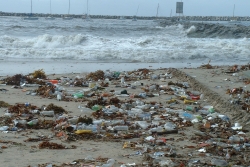The county Board of Supervisors voted to postpone the Clean Water, Clean Beaches initiative on March 12 and directed county officials to create a new measure as well as report to the board on a quarterly basis on their outreach efforts on a potential new initiative.
Clean Water, Clean Beaches would have generated revenue for local water-saving programs and created regional watershed authorities through a parcel tax in a special mail- in election.
Property owners would have been assessed approximately $54 annually for storm water runoff cleanup under the proposal.
“While I have long supported efforts to ensure clean water and beaches, I have been against this measure from the beginning as it was not fair and transparent in content or process,” said Fourth District Supervisor Don Knabe, the author of the motion to derail the measure. “We must start over.
“Unfortunately, our stormwater problem is exacerbated by the expensive, and often unrealistic, demands placed on us by the Regional Water Quality Control Board, which increased the Total Maximum Daily Loads from two pollutants in the old permit to 33 pollutants, which would cost this region tens of billions of dollars to comply with in the next 20 years alone,” the supervisor added.
The motion includes a target election date of June or November of 2014.
Ballona Creek Renaissance President James Lamm did not return calls for comment on the measure, which environmental organizations involved with the initiative say would have helped with efforts to reduce storm water pollution into Ballona Creek.
Councilwoman Meghan Sahli-Wells, who was active in the sustainability movement before being elected to the council last year, also did not respond to calls and emails for comment.
Santa Monica -based Heal the Bay is one of the most prominent supporters of Clean Water Clean Beaches. Kirsten James, the environmental organization’s water quality director, was hopeful that the supervisors would approve the measure.
“There has been a lot of progress made since (the item was postponed in January),” James said before the hearing. She cited project selection, criteria for funding and rebate incentive programs for property owners as important additions to the proposal.
She also disagreed with Knabe’s characterization of the water quality board’s requirements per the Clean Water Act.
“I don’t view them as unrealistic,” she said. “It does take money to put these stormwater pollution solutions in place.”
A community contiguous to Culver City backed the water proposal. The Palms Neighborhood Council voted to support the measure at its March meeting.
Culver City Public Works Director Charles Herbertson said the city did not take a position on the county measure but has taken a number of steps to confront storm water pollution, as have many Westside cites.
In addition to installing catch basin screens on storm sewer entrances throughout the city, Public Works has also been involved in initiatives that redirect stormwater into the ground to be used for irrigation purposes.
“At one location near the Julian Dixon Library near Ballona Creek, we’re capturing runoff from the parking lot,” Herbertson said.
In other locations, including one on Baldwin Avenue near City Hall, there are connector pipe screens on storm sewers that capture large loads of refuse that could otherwise make it into the creek.
James did find some things to be encouraged about, despite the measure’s postponement. “The measure is still alive,” she noted. “It seemed like the vast majority of the speakers were supporters and the momentum is still going.
“It wasn’t our ideal outcome, but we’re happy that it’s moving forward and we hope that the proper outreach will be done by the county.”
Knabe, who was critical in securing a 60-day delay in voting on the measure in January when it came before the board the first time, reiterated his preference for a ballot initiative as opposed to a special election.
“Should this board in the future decide to move forward with a new Clean Water, Clean Beaches measure, it should be put before the voters in a general election ballot and not through a mail-in ballot, as was originally proposed,” he said.
A ballot initiative would require a two-thirds vote in order for a parcel tax measure to become law, while a special election would require a simple majority.
Herbertson said he thought city officials might invite county representatives to discuss their storm water proposal before the council if Clean Water, Clean Beaches makes it onto the ballot next year.
Second District Supervisor Mark Ridley-Thomas, who represents Culver City, did not return phone calls for comment.

